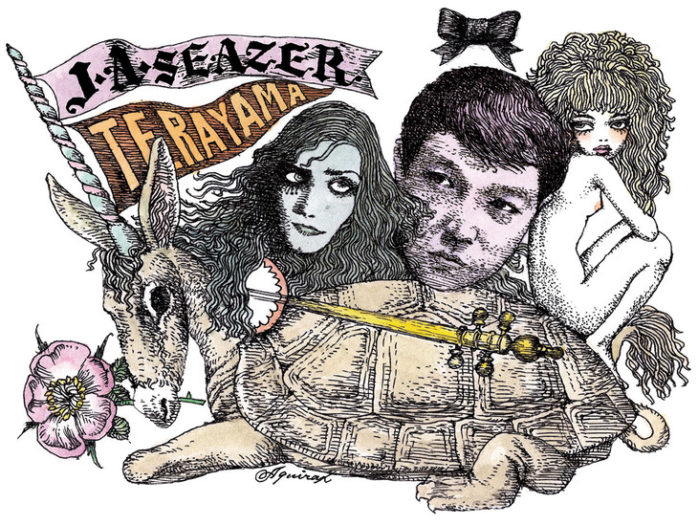Popular song people are strong people. There is no way you can participate in all the changes around you unless you can take on seven enemies with a smile on your face and live by phrases from songs that will soon fade away and disappear.
That’s why I suggest that the Japanese should become “One Hundred Million Popular Song People.”
Shuji Terayama, from Throw Away Your Books and Run into the Streets.
Come Down Moses; lyrics by Shuji Terayama, music by Takahashi Chikuzan the Second; performed by Takahashi Chikuzan the Second on samisen with Akemi Ota on piano. English lyrics below.
When everyone’s gone away
I think I’ll write a letter
To myself
When everyone’s gone away
I think I’ll smoke the last cigarette in the world
Come down Moses, you’re no good
Come down Moses, you’re no good
Take me to the end of the world
Take me to the end of the world
When everyone’s gone away
I think I’ll pretend that I’m drunk
And softly weep to myself
When everyone is dead
At least in the morning
I think I’ll wear my spring clothes
Come down Moses, you’re no good
Come down Moses, you’re no good
Take me to the end of the world
Take me to the end of the world
For the very last time
Take me to the end of the world
Terayama produced lyrics to over a thousand songs, ranging from the million-selling ballad Like a Motherless Child to obscure exercises in avant-garde wordplay. He wrote a guidebook to jazz and was an enthusiast of Wagner as well as being knowledgeable about then-contemporary French composers such as Messiaen, Jolivet and Duret. Above all he was attracted to kayokyoku, Japanese popular songs in the chanson style, as opposed to the post-Beatles “group sounds” and rock music.
Popular song is the blues of our era. And the most important characteristic of popular songs is that you don’t sing them in chorus.
Shuji Terayama; from Throw Away Your Books and Run into the Streets.
There was testament to the breadth of his musical engagement at the recent two-night Shuji Terayama 80th Anniversary Music Festival, which featured artists ranging from free jazzer Toshinori Kondo to Mii from the Pink Lady duo and Sugizo of glam band X Japan. The musical director was J.A. Seazer – aka Julious Arnest Caesar, aka Takaaki Terahara from Miyazaki Prefecture – who created the music for most of Terayama’s films and theatrical productions.
As the above picture suggests, Seazer / Caesar was a futenzoku (Japanese hippie) who dropped out of art-school and joined Tenjo Sajiki, Terayama’s avant garde theatre troupe, in 1969 as an actor. He had no musical background. Quite out of the blue Terayama, who believed in the power of chance and randomness, charged him with creating and arranging the music for an imminent theatrical production.
Seazer’s music blends folk, pop, marches, children’s songs, traditional Japanese styles and modern classical. A dozen years younger than Terayama, he was also attuned to the emerging rock culture and used well-known musicians such as Kuni Kawauchi of The Happenings Four and Shigemi Ishima of Flower Travellin’ Band on the soundtrack of Throw Away Your Books and Run into the Streets. Together with Terayama, he created the musical Lemming (1978) which featured Come Down Moses as its theme song.
Come Down Moses; lyrics by Shuji Terayama, music by J. A. Caesar; performed by Carmen Maki.
Come Down Moses was sung at Terayama’s funeral in 1983.

